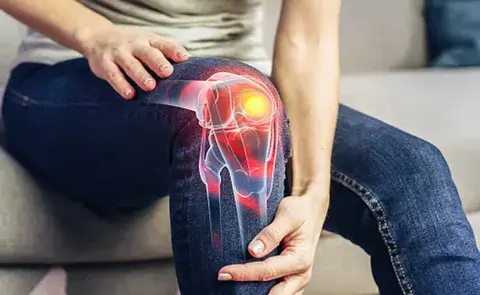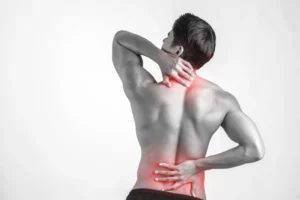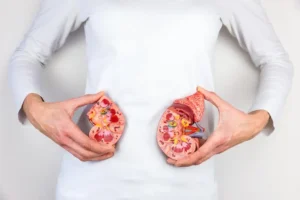Why Do My Knees Hurt More in the Morning? Let’s Talk Knee Arthritis

Morning knee pain can be a common complaint among those with knee arthritis. Many individuals experience increased stiffness and discomfort in their knees upon waking, which typically improves as they move throughout the day. This morning pain occurs because inflammatory proteins accumulate in the joint overnight when there’s less movement, causing increased stiffness and pain when first getting out of bed.
The pattern of morning knee pain is particularly characteristic of osteoarthritis, the most common form of arthritis affecting the knees. During sleep, the synovial fluid that lubricates the joints becomes more viscous and less effective. Additionally, the cartilage in arthritic knees absorbs fluid during periods of rest, leading to temporary swelling that creates pressure on nerve endings.
Understanding why knee pain worsens in the morning is the first step toward finding effective management strategies. Various approaches can help reduce this morning discomfort, including gentle stretching before getting out of bed, applying heat to the affected joints, and maintaining a consistent exercise routine that strengthens the muscles supporting the knees.
How Knee Joints Function While You Sleep
During sleep, knee joints remain relatively inactive for extended periods. This inactivity causes synovial fluid, which lubricates and nourishes joint cartilage, to become more viscous and less effective at cushioning the joint.
Blood circulation also slows down while sleeping, reducing the supply of oxygen and nutrients to joint tissues. This reduced circulation can temporarily increase stiffness and discomfort.
Joint positions during sleep further impact morning pain. Many people sleep with their knees slightly bent, which can increase pressure on already inflamed joints and contribute to morning stiffness.
The body’s inflammatory responses often intensify during the night, particularly between 2-4 AM when cortisol levels are at their lowest. This natural inflammatory cycle can worsen arthritis symptoms by morning.
Common Symptoms of Knee Arthritis in the Morning
Key Morning Symptoms:
- Stiffness lasting 30+ minutes after waking
- Difficulty with initial weight-bearing
- Creaking or grinding sensations (crepitus) with first movements
- Swelling that’s more noticeable in the morning
Pain typically concentrates on the inside of the knee joint where cartilage wear is often greatest. The discomfort usually improves with gentle movement as joints “warm up” and synovial fluid begins circulating properly again.
Weather changes, particularly cold or damp conditions, frequently intensify morning knee pain. Many patients report accurately predicting weather shifts based on their knee discomfort levels.
Morning pain intensity often correlates with activity levels from the previous day, creating a pattern where overexertion leads to worse morning symptoms.
Distinguishing Arthritis From Other Causes of Knee Pain
Arthritis morning pain gradually improves with movement, unlike injuries which typically worsen with activity. This “gelling phenomenon” where pain decreases after movement is highly characteristic of arthritis.
Differential Features:
| Condition | Morning Pattern | Response to Activity |
|---|---|---|
| Arthritis | Worst at waking, improves with movement | Initially improves with gentle use |
| Bursitis | Pain with specific movements regardless of time | Worsens with continued activity |
| Tendonitis | Less morning-specific, more activity-related | Consistently worsens with use |
Pain location also provides important diagnostic clues. Arthritis pain typically affects the entire joint, while other conditions cause more localized discomfort.
Types And Causes of Knee Arthritis
Knee arthritis encompasses several distinct conditions that damage the knee joint, each with unique causes and characteristics. Understanding these differences can help patients identify their specific condition and seek appropriate treatment.
Osteoarthritis: The Most Common Culprit
Osteoarthritis (OA) affects approximately 33% of adults over 60 years old. This degenerative joint disease occurs when the protective cartilage cushioning the ends of bones wears down gradually over time.
Primary risk factors include:
- Age: The likelihood increases significantly after 45
- Genetics: Family history plays a substantial role
- Weight: Each extra pound adds 3-4 pounds of pressure on knee joints
- Previous injuries: Even decades-old injuries can contribute
OA develops as the smooth cartilage surface roughens and thins, causing bones to rub together. This friction leads to pain, stiffness, and reduced mobility. The body responds by forming bone spurs (osteophytes) and thickening the joint capsule, further limiting motion.
Rheumatoid Arthritis and Inflammatory Factors
Rheumatoid arthritis (RA) is an autoimmune condition where the immune system mistakenly attacks the synovium—the lining of the joint capsule. Unlike osteoarthritis, RA is not primarily caused by wear and tear.
The inflammation from RA causes:
- Thickening of the synovial membrane
- Production of excess joint fluid
- Damage to cartilage and bone
- Stretching of supporting ligaments
Women are 2-3 times more likely than men to develop RA, with onset typically occurring between ages 30-60. Morning symptoms from RA tend to last longer—often more than an hour—and affect multiple joints symmetrically.
Post-Traumatic and Secondary Arthritis
Post-traumatic arthritis develops after knee injuries, affecting approximately 12% of patients with symptomatic knee OA. A single traumatic event like an ACL tear, meniscus injury, or fracture can initiate this condition.
Key characteristics include:
- Accelerated onset: Symptoms may appear years before typical age-related arthritis
- Localized damage: Often affects specific compartments of the knee
- Mechanical symptoms: May include catching, locking, or giving way
Secondary arthritis stems from underlying conditions rather than direct injury. Conditions contributing to secondary arthritis include:
- Avascular necrosis (bone death from inadequate blood supply)
- Metabolic disorders like gout or pseudogout
- Hemophilia causing bleeding into joints
- Infection (septic arthritis)
These types often cause uneven joint damage, resulting in alignment issues that further accelerate joint deterioration. Each case requires targeted treatment approaches addressing both symptoms and underlying causes.
Managing Morning Knee Pain Effectively
Morning knee pain can be managed through targeted strategies that reduce discomfort and improve mobility. Proper routines, lifestyle modifications, medical evaluation when necessary, and appropriate treatments can significantly decrease morning stiffness and pain.
Beneficial Morning Routines and Stretches
Starting the day with gentle movement helps lubricate knee joints and reduce stiffness. Before getting out of bed, perform 10-15 gentle knee bends while lying down to increase circulation.
Apply a warm towel or heating pad to knees for 10-15 minutes to relax muscles and improve flexibility. Heat therapy works particularly well for morning arthritis pain.
Gentle stretching exercises improve range of motion and decrease pain. Try these effective options:
- Hamstring stretch: Sit with one leg extended, reach toward toes for 20-30 seconds
- Quadriceps stretch: Stand holding onto a chair, bend knee and bring heel toward buttocks
- Calf stretch: Step forward with one foot, keeping back leg straight with heel on ground
Progressive movement is key. Begin with gentle activities and gradually increase intensity as joints warm up.
Lifestyle Adjustments and Home Remedies
Maintaining healthy weight significantly reduces pressure on knee joints. Each pound lost decreases knee stress by 4-6 pounds.
Sleep position matters for knee comfort. Place a pillow between knees when sleeping on your side, or under knees when on your back.
Supportive footwear with proper arch support and cushioning reduces joint stress throughout the day. Avoid high heels and completely flat shoes.
Anti-inflammatory foods help manage knee pain naturally. Include these in your diet:
| Food Category | Examples |
|---|---|
| Fatty fish | Salmon, mackerel, sardines |
| Colorful fruits | Berries, cherries, oranges |
| Spices | Turmeric, ginger, cinnamon |
| Healthy oils | Olive oil, avocado |
When to Consider Medical Evaluation
Persistent morning knee pain lasting more than two weeks warrants medical attention. This may indicate progression of arthritis or another underlying condition.
Significant swelling, redness, or warmth around the knee suggests inflammation requiring professional assessment. These symptoms could indicate infection or inflammatory arthritis.
Inability to bear weight or severe pain that prevents normal activities needs immediate evaluation. Mechanical issues like torn cartilage may be responsible.
New symptoms like locking, clicking, or giving way indicate potential structural problems. These mechanical symptoms often require specialized treatment.
Medications and Non-Surgical Treatments
Over-the-counter anti-inflammatory medications like ibuprofen or naproxen can reduce morning pain and inflammation. Take with food to minimize stomach irritation.
Topical treatments provide localized relief without systemic side effects. Options include:
- Menthol or capsaicin creams
- Diclofenac gel
- CBD-infused balms
Physical therapy strengthens supporting muscles and improves joint stability. A therapist can develop a customized exercise program targeting specific knee issues.
Long-Term Strategies for Knee Joint Health
Joint-friendly exercise forms the cornerstone of knee arthritis management. Low-impact activities like swimming, cycling, and walking put minimal stress on affected joints while maintaining mobility.
Proper footwear provides crucial support. Shoes with cushioned soles and adequate arch support help distribute weight evenly across the knee joint. Orthotic inserts may offer additional benefits for those with specific foot mechanics issues.
Supplements worth considering:
- Glucosamine and chondroitin
- Omega-3 fatty acids
- Vitamin D
The Role of Physical Activity and Weight Management
Weight management directly impacts knee health. Each pound of body weight creates four pounds of pressure on the knees during walking. Losing just 10 pounds can reduce knee pain by 20-50% in overweight individuals with arthritis.
Regular strength training targets muscles supporting the knee joint. Strong quadriceps, hamstrings, and calf muscles provide better joint stability and improved function. Even light resistance training twice weekly shows measurable benefits.
Flexibility exercises maintain range of motion. Daily gentle stretching helps prevent stiffness and improves joint mobility. Focus on hamstring, quadriceps, and calf stretches for maximum benefit.
Physical therapists can design personalized exercise programs that address specific needs. Professional guidance ensures proper technique and appropriate progression of activities without causing additional joint damage.
Frequently Asked Questions
Knee arthritis presents unique challenges, particularly during morning hours when pain and stiffness tend to be most pronounced. The following questions address common concerns about knee arthritis symptoms and management strategies.
What causes morning stiffness in knees with arthritis?
Morning stiffness in arthritic knees occurs primarily due to inactivity during sleep. Synovial fluid, which lubricates the joints, becomes more viscous when stationary for extended periods.
Are there specific symptoms that indicate knee arthritis?
Knee arthritis typically manifests with several distinctive symptoms beyond morning pain. Joint crepitus—a grinding, clicking, or popping sensation during movement—often indicates cartilage deterioration.
What are the best management strategies for knee arthritis pain in the morning?
Gentle stretching before getting out of bed can significantly reduce morning knee pain. Slowly moving the joint through its available range of motion helps redistribute synovial fluid and decrease stiffness.
Can lifestyle changes alleviate morning knee arthritis pain?
Weight management represents one of the most effective lifestyle interventions for knee arthritis. Research indicates that each pound of weight loss reduces pressure on the knees by approximately four pounds during walking activities.
How does the progression of knee arthritis affect morning pain over time?
Early-stage knee arthritis typically presents with intermittent morning stiffness lasting 15-30 minutes. As the condition advances, this morning discomfort extends in both duration and intensity.
What treatments are recommended for reducing the severity of morning knee arthritis symptoms?
Pharmaceutical interventions often begin with over-the-counter analgesics and anti-inflammatory medications. Physical therapy offers substantial benefits through personalized exercise programs that improve joint function and reduce pain. Assistive devices such as properly fitted knee braces can provide stability during morning activities when pain is most acute.






